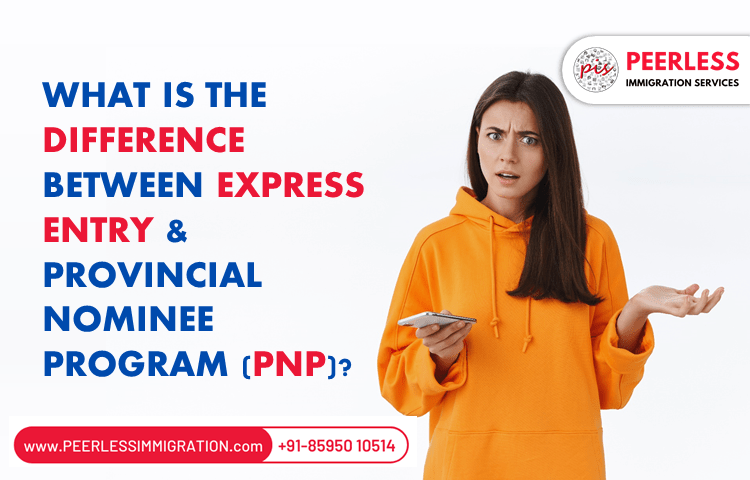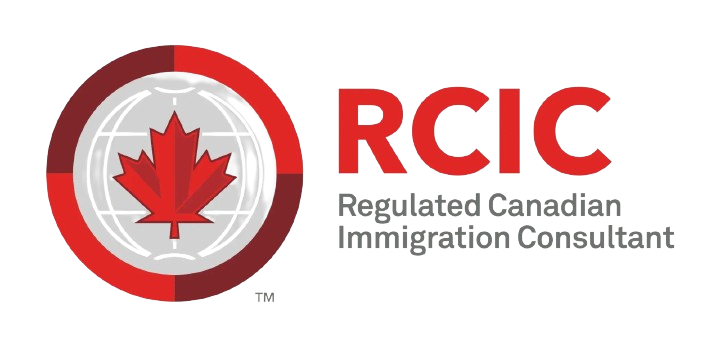
What is the difference between PNP and Express Entry?
Canada is highly desirable for immigration due to its high-quality education, universal healthcare, employment insurance benefits, family and caregiver benefits, and numerous other advantages for residents. Even potential applicants with no prior connection to Canada can acquire these benefits by obtaining Canadian Permanent Residence status.
To attain permanent residency in Canada, the Immigration, Refugees, and Citizenship Canada (IRCC), which is the immigration department of the Government of Canada, oversees several pathways, the most popular of which include:
- Express Entry, and
- Provincial Nominee Program (PNP)
IRCC identifies and communicates with qualified and talented applicants based on their abilities and capacity to contribute to Canada’s economy, and assists in meeting Canada’s labor market needs.
Difference between Express Entry and PNP
Express Entry and the Provincial Nominee Program (PNP) are both ways to move to Canada, but they’re different in terms of who can apply, how to apply, and how much control the provinces have. Let’s look at the main differences between Express Entry and PNP:
Purpose
- Express Entry: This is a federal immigration system designed to manage the selection of skilled workers for economic immigration programs. It includes the Federal Skilled Worker Program, the Federal Skilled Trades Program, and the Canadian Experience Class.
- Provincial Nominee Program (PNP): This program allows individual provinces and territories in Canada to nominate individuals who have the desired skills and experience to meet their specific economic and labor market needs.
Eligibility Criteria
- Express Entry: Eligibility is based on factors such as age, education, work experience, language proficiency (English or French), and adaptability. Applicants are ranked based on the Comprehensive Ranking System (CRS) score, which considers various factors, and the highest-ranking candidates are invited to apply for permanent residency through regular draws.
- Provincial Nominee Program (PNP): Eligibility criteria vary by province or territory. Each province can set its own specific requirements based on its economic needs. Generally, PNP pathways target individuals with skills or experience in demand in that province.
Application Process
- Express Entry: Applicants interested in Canada PR Visa, submit their Express Entry profile online stating their age, education, experience, language proficiency, and connections in Canada (if applicable). They are then entered into a pool of candidates and are issued an Express Entry profile number and Job Seeker Validation Code. Regular draws are conducted, and candidates with the highest CRS scores are invited to apply for permanent residency.
- Provincial Nominee Program (PNP): Applicants interested in PNP must apply directly to the specific province or territory’s PNP stream. If nominated, they receive a Provincial Nomination Certificate. Having a nomination certificate gives them a boost of 600+ points in their Express Entry CRS score.
Provincial Involvement:
- Express Entry: Provinces are not directly involved in selecting candidates in the Express Entry system. However, if a candidate is nominated by a province through the PNP, they receive additional CRS points, increasing their chances of receiving an Invitation to Apply (ITA) for permanent residency.
- Provincial Nominee Program (PNP): Provinces have a more active role in selecting candidates through their PNP streams. They can nominate individuals who meet their specific criteria and labor market needs.
In summary, Express Entry is a federal system for skilled workers, while PNP allows provinces to nominate candidates based on their specific economic requirements. The two pathways can also intersect, as a provincial nomination can greatly enhance an applicant’s chances in the Express Entry system.
How to apply for Canadian PR through a non-Express Entry PNP pathway?
Applying for a Provincial Nominee Program (PNP) pathway that is not part of the Express Entry system involves several steps. Here’s a general outline of the process:
- Choose a Province: Select a Canadian province or territory that matches your skills and experience. Each province offers its own PNP streams, each having distinct eligibility requirements.
- Check Eligibility: Check the eligibility criteria of the PNP stream you’re considering. These eligibility criteria could encompass education, work history, language skills, and other factors. Make sure you fulfill all the necessary prerequisites.
- Submit Expression of Interest (EOI) or Application: Depending on the province, you need to submit an Expression of Interest (EOI) or directly apply to the PNP stream. An EOI is the first step where you express your interest in the program and provide information about your qualifications.
- Receive Invitation: If your EOI or application is selected, you’ll receive an invitation from the province to apply for nomination under the PNP stream.
- Complete Application: Follow the instructions provided by the province to complete your PNP application. This usually involves submitting supporting documents, such as educational credentials, work experience proof, language test results, and more.
- Wait for Nomination: Once you submit your application, the province will review it and assess whether you meet their specific needs and criteria. If you’re approved, you’ll receive a nomination certificate from the province.
- Apply for Permanent Residence: Once you have the nomination certificate, you can apply for permanent residency through IRCC. This step entails submitting all the requested documents, along with medical and police verification, and paying its fees within 180 days from its issuance.
- Express Entry (if applicable): If the PNP application is not linked to Express Entry, you’ll need to follow the regular permanent residency application process. In case, if it is, then you will need to indicate that you have a provincial nomination. This significantly boosts your Express Entry CRS score, increasing your chances of receiving an Invitation to Apply (ITA) for permanent residency.
- Wait for Processing: After applying for permanent residency, you’ll need to wait for the federal government to process your application. Processing times can vary, so be patient.
- Final Steps: If your application is approved, you’ll receive a Confirmation of Permanent Residence (COPR) and can proceed to make arrangements to move to Canada.
Is Express Entry Better than Provincial Nominee Program?
Whether Express Entry or the Provincial Nominee Program (PNP) is better depends on your individual circumstances, goals, and preferences. Both pathways have their own advantages and factors to consider:
Express Entry:
- Fast Processing: Express Entry is known for its relatively fast processing times compared to some PNP streams.
- Multiple Federal Programs: It’s the route for the Federal Skilled Worker Program, Canadian Experience Class, and Federal Skilled Trades Program, which offer a wide range of opportunities.
- 600+ Points in CRS Score: If you receive a provincial nomination through a PNP linked to Express Entry, you get a significant boost in your Comprehensive Ranking System (CRS) score.
- Right to mobility: You can potentially move between provinces more easily since you’re not tied to a specific provincial nomination.
Provincial Nominee Program (PNP):
- Direct Nomination: PNP allows provinces to select individuals based on their specific labor market needs, so you might have a higher chance of nomination if your skills align with a particular province’s demand.
- Less CRS Score Requirements: Some PNP streams have lower CRS score requirements compared to Express Entry-only candidates.
- Multiple PNP Streams: PNP streams can be tailored to certain professions or industries, making it a good option if your occupation is in high demand in a particular province.
- Adaptability Benefits: If you have a job offer or family ties in a particular province, PNP might be more favorable.
- Enhanced Nomination: If you have a nomination, your application for permanent residency has a higher chance of approval.
- Residency Requirement: According to the update, provinces such as Manitoba, Newfoundland and Labrador, and Prince Edward Island required individuals to live and work in the province for a specific period of time.
In summary, if you qualify for Express Entry and are seeking a streamlined and expedited process, Express Entry is more suitable. On the other hand, if you have a specific province in mind, possess a valid job offer or family connections in that province, or if your job profile is in demand in a particular region, the PNP option could be a better fit.
Application Cost
The application cost involved in Express Entry post receiving an Invite to Apply (ITA) is:
- Primary Applicant : CAD $1365 (850+515)
- Secondary Applicant (if applicable): CAD $1365 (850+515)
- Per Dependent Child (if applicable): CAD $230 per child
On the other hand, if the applicant intends to submit a Canadian PR Visa application through the Provincial Nominee Programs, they are required to pay two fees, i.e., the Provincial Application Processing Fees and later, Federal Government Fees for processing the Canada PR Visa Application. Provincial application fees vary by province and can range from CAD $0 to CAD $1500.
Connect with our Immigration Experts
Feel free to reach out to us for answers to your questions. You can contact our expert at +91-8595010514 or send an email to info@peerlessimmigration.com















